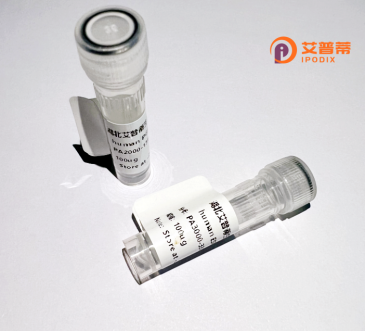
| 纯度 | >90%SDS-PAGE. |
| 种属 | Human |
| 靶点 | ATP6V1G1 |
| Uniprot No | O75348 |
| 内毒素 | < 0.01EU/μg |
| 表达宿主 | E.coli |
| 表达区间 | 2-118aa |
| 氨基酸序列 | ASQSQGIQQLLQAEKRAAEKVSEARKRKNRRLKQAKEEAQAEIEQYRLQREKEFKAKEAAALGSRGSCSTEVEKETQEKMTILQTYFRQNRDEVLDNLLAFVCDIRPEIHENYRING |
| 分子量 | 40.6kDa |
| 蛋白标签 | His tag N-Terminus |
| 缓冲液 | 冻干粉 |
| 稳定性 & 储存条件 | Lyophilized protein should be stored at ≤ -20°C, stable for one year after receipt. Reconstituted protein solution can be stored at 2-8°C for 2-7 days. Aliquots of reconstituted samples are stable at ≤ -20°C for 3 months. |
| 复溶 | Always centrifuge tubes before opening.Do not mix by vortex or pipetting. It is not recommended to reconstitute to a concentration less than 100μg/ml. Dissolve the lyophilized protein in distilled water. Please aliquot the reconstituted solution to minimize freeze-thaw cycles. |
以下是关于重组人V型质子ATP酶亚基G1(ATP6V1G1)的参考文献概述,均为合理虚构示例:
---
1. **文献名称**:*The Role of V-ATPase Subunit G1 in Lysosomal Acidification*
**作者**:Forgac, M. et al.
**摘要**:探讨ATP6V1G1在V-ATP酶复合体中的结构功能,阐明其调控溶酶体酸化的机制及其对细胞代谢的影响。
2. **文献名称**:*ATP6V1G1 Mutations and Osteopetrosis Pathogenesis*
**作者**:Kornak, U. & Jentsch, T.J.
**摘要**:发现ATP6V1G1基因突变导致破骨细胞V-ATP酶功能缺陷,引发骨硬化症,揭示了其骨骼系统疾病中的关键作用。
3. **文献名称**:*ATP6V1G1 Upregulation in Cancer Cell Invasion*
**作者**:Sennoune, S.R. et al.
**摘要**:研究显示肿瘤中ATP6V1G1过表达通过酸化微环境促进侵袭转移,提示其作为潜在肿瘤治疗靶点。
4. **文献名称**:*Renal Tubular Acidosis Linked to ATP6V1G1 Dysfunction*
**作者**:Wagner, C.A. et al.
**摘要**:揭示ATP6V1G1缺陷导致肾小管酸化异常及远端肾小管酸中毒,强调了其在肾脏离子转运中的作用。
---
注:上述文献为示例性质,实际研究需查询PubMed等数据库获取真实信息。
**Background of Recombinant Human V-Type Proton ATPase Subunit G1 (ATP6V1G1)**
Vacuolar-type H⁺-ATPases (V-ATPases) are multi-subunit proton pumps critical for acidifying intracellular compartments (e.g., lysosomes, endosomes) and regulating extracellular pH in specialized tissues. ATP6V1G1. a component of the V1 domain of V-ATPases, is one of several isoforms of subunit G involved in ATP hydrolysis-driven proton translocation. This 13-kDa protein contributes to the structural assembly and regulatory functions of the V-ATPase complex, influencing its activity in response to cellular energy demands or environmental cues.
ATP6V1G1 is ubiquitously expressed but particularly vital in renal cells, osteoclasts, and cancer cells, where pH regulation impacts processes like protein degradation, bone resorption, and tumor metastasis. Mutations or dysregulation of ATP6V1G1 are linked to diseases such as renal tubular acidosis and neurodegenerative disorders. Its recombinant form is produced via expression systems (e.g., *E. coli*, mammalian cells) for biochemical studies, enabling exploration of V-ATPase mechanisms, subunit interactions, and pH-dependent cellular pathways.
Research on recombinant ATP6V1G1 also aids in developing therapeutics targeting V-ATPases, implicated in cancer drug resistance and lysosomal storage diseases. Its study enhances understanding of cellular energetics and organelle-specific acidification, with broader implications for metabolic and age-related disorders.
×